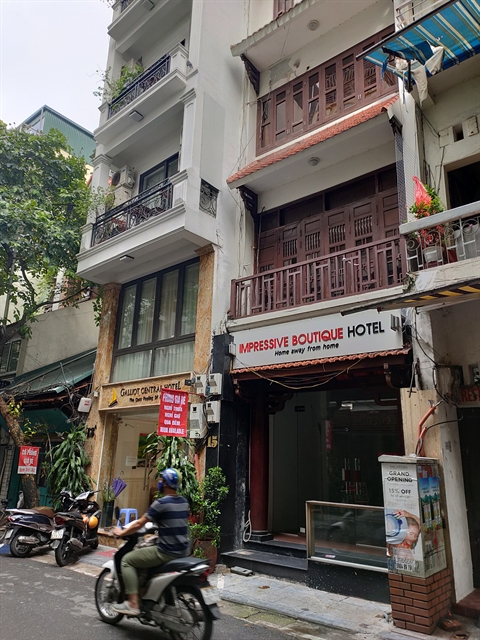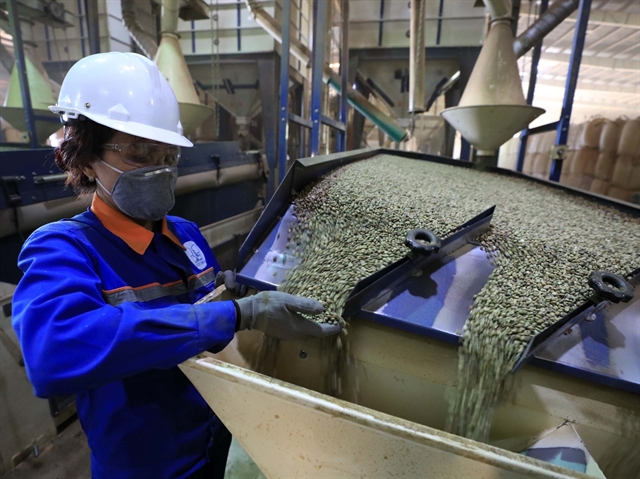 Economy
Economy


|
| Hotels in Ngõ Huyện Street in Hà Nội must stop running or turn themselves into low-cost hourly hotels to cope with the new wave of COVID-19. — VNS Photo Đoàn Tùng |
By Minh Hương
HÀ NỘI — The lobby of a hotel on Hàng Bè Street in the heart of Hà Nội that used to be full of tourists is now filled with furniture.
Nguyễn Thị Ngọc Hoa reopened the hotel in late May after social distancing orders ended, but now, with the second wave of the COVID-19 pandemic hitting hard, she has decided to cut her losses and sell the hotel.
Before the pandemic, Hoa hotel’s revenue was about VNĐ250 million (US$10,800) per month but in the last five months of this year, she could barely afford to pay her operating bills and employees.
The hotel she paid more than VNĐ100 billion for three years ago is now on sale for VNĐ67 billion.
“The more I stay, the more I lose. I see no future in this place in such a situation," she told Việt Nam News.
After 99 days without community transmission, the pandemic returned in late July and hurt domestic tourism, making a bad situation worse for Hoa and other hotel owners. Foreigners account for 90 per cent of guests for many hotels in the Old Quarter.
Several popular hotels in the Old Quarter have closed again after reopening and don't know when they'll be back, while other establishments that closed during the first wave will never return.
Realty research firm Savills reported the pandemic has had a strong impact on the hotel market's performance in the capital, noting the occupation capacity of 3-5 star hotels only reached 21 per cent in the second quarter.
Đỗ Thu Hằng, director of research and consultancy department at Savills, said the capacity of the hotel market supply in Hà Nội was nearly 10,000 rooms with 16 five-star hotels, 19 four-star hotels and 31 three-star hotels. However, two four-star hotels and eight three-star hotels in Hoàn Kiếm District were still closed. Hằng said some new hotel projects had completed construction but developers have not yet decided to open.
The People's Committee of Hoàn Kiếm District said before the pandemic, the district had 672 accommodation establishments including hotels, guest houses, motels and homestays but by the end of June 2020, there were only 405 establishments still operating.
Despite a lack of official figures, most stakeholders reckon the second wave of the pandemic would have a greater impact on hotels than the first.
Instead of closing, the Stelward Prima Hotel on Chân Cầm Street has used its facilities to offer monthly rentals and film café services.
According to the owner of the hotel Hostesk Nguyen, normally the price for one night was from VNĐ700,000 to more than VNĐ1 million, now they must offer rooms in the three-star hotel at VNĐ6 million per month with full service.
To retain employees, he has also turned some rooms in the hotel into a film café for local couples, asking VNĐ200,000 to VNĐ300,000 for the first two hours with two drinks and two snacks.
“Our rooms have big TVs with Netflix, now we have installed a good sound system with 5.1 surround sound and made them a cinema box. It's all to help my employees have things to do," he told Việt Nam News.
Nguyễn Thu Bích was selling iced tea in the lobby of Hotel Trendy on Lò Sũ Street and said she used to be the hotel's accountant, but now as the hotel is closed, the owner let her sell the tea.
Still open for guests, Nguyễn Vân Hải, the receptionist of the nearby Hanoi Malo Hotel is also selling ice tea and sugarcane juice.
“There should be something to do to overcome this situation. It is still good to sell the juice here as it is in the Old Quarter with a lot of local tourists," he said.
Some small hotels in the area have reduced room rates by up to 70 per cent, with many rooms on offer for between VNĐ200,000 and VNĐ400,000 per night to attract local customers instead of foreigners. — VNS


.jpg)

